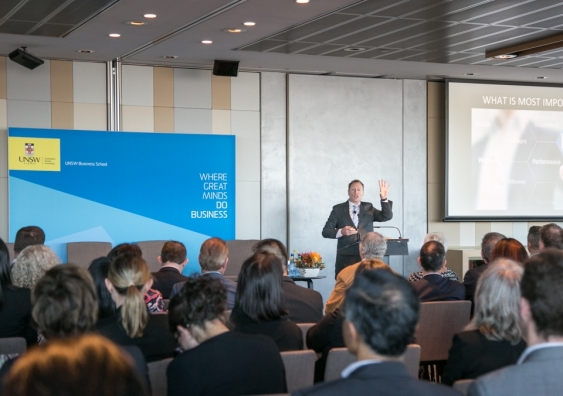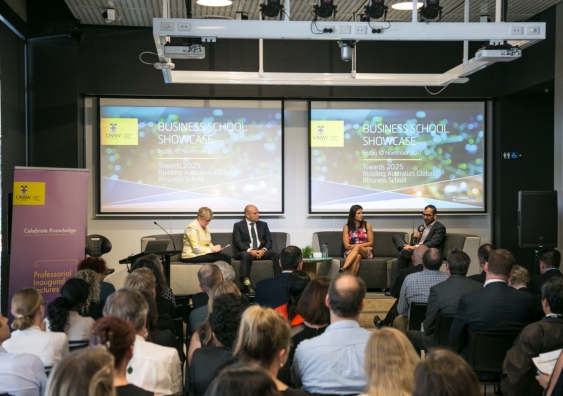Building Australia’s global Business School
UNSW Business School’s great minds came together last week for their inaugural showcase, delivering an insightful program highlighting the distinctive features of the school and its partnerships.
UNSW Business School’s great minds came together last week for their inaugural showcase, delivering an insightful program highlighting the distinctive features of the school and its partnerships.

UNSW Business School’s great minds came together last week for their inaugural showcase, delivering an insightful program highlighting the distinctive features of the Business School and its partnerships.
Hosted by Business School Dean Professor Chris Styles, the showcase opened with an alumni breakfast titled "The Business of Wellbeing", one of the “Business of ...” series that aims to provide insights in new and emerging industries.
The Business of Wellbeing keynote address was delivered by Jeremy Rolleston, UNSW alumnus, Olympian and founder of digital wellness tool Active8Me. Rolleston shared his story with 250 attendees on the importance of an holistic approach to wellness.
“The wellness industry is a $3 trillion market, three times the size of the worldwide pharmaceutical market, with digital health being a $76 billion worldwide market,” Rolleston said.
“Being fit does not necessarily mean you are healthy; health is defined as a purely physical state. Wellness is a much more holistic view, including mental health and stress.”
He said a lot of corporates and insurers engaged only around exercise, and at a basic level like step-trackers, but nutrition and mindset were the two biggest factors.
“You can’t out-train a bad diet. And what about mindset? That’s behaviour change,” he said.
Rolleston called on companies and insurers to follow the likes of Google and Facebook, which saw wellbeing as an investment in their most important asset – people.
The address was followed by a panel discussion led by Stephen Scheeler, AGSM Executive in Residence and former Managing Director Facebook (Aust/NZ), on the challenges and importance of good leadership in driving workplace wellness to achieve business outcomes.
Panellists included Lucinda Brogden, Co-Chair for the National Mental Health Commission, Deanne Stewart, CEO MetLife Australia, and Aimee Willis, Group Manager Wellbeing, Westpac Group.
Willis noted: “The challenge is varying. We look at how an individual’s values link to their role, asking do you feel like you are contributing? Do you feel challenged? Do you feel you have a learning and development opportunity? Our intention is to have a cultural influence and it is built into how Westpac operates.
“Over 40% of issues that come through the Wellbeing team at Westpac are non-work related. People bring their whole selves into the workplace so we aim to support them as a whole.”

Panel discussion on Indigenous entrepreneurship and leadership
The Business School program continued at the Kensington campus with a hands-on, experimental research session and an overview of the Business School’s impressive statistics.
Styles noted that the UNSW Business School has been ranked number one for:
Excellence in teaching and learning (Australian Federal Government)
Research in auditing (worldwide)
Research in commerce and economics (equal first, Australian Federal Government)
Highest high school entry score for business undergraduate program in Australia
Rates best in Australia in Applied Economics in ERA 2015 – the only university to be rated ‘well above world standard’ in this discipline
In the QS World University rankings, the Business School is No.11 in the world in Accounting and Finance, No. 23 in Business and Management, and No. 32 in Economics and Econometrics.
“And we are the number one source of talent for graduate entry roles across all the major employers in accounting, advisory and financial services sector,” Styles said.
The session was hosted by Associate Dean of the Business School Professor Nick Wailes, and attendees moved onto a series of demonstrations in flipped classrooms, highlighting the Business School's excellent standard of education at scale.
“UNSW Business School is the number one source of talent for graduate entry roles across all the major employers in accounting, advisory and financial services sector,” Wailes said.
“By integrating the most innovative developments in digital and face-to-face learning into novel solutions, we are improving educational quality and the student experience.”
The various demonstrations included an overview of:
Uco – an AGSM innovation for digital exams;
Playconomics, a technology-enabled ‘video game’ to teach students economics;
Marketing – how teaching excellence is delivered in a large classroom setting via a Student Relationship Engagement System (SRES), which won the 2017 Pearson and ACODE Award for Innovation in Technology Enhanced Learning; and
The School of Information Systems and Technology Management showed how they have moved from a traditional small class format to an agile framework.
The final panel of the day focused on social impact and discussed Indigenous entrepreneurship and leadership by former and current Indigenous students. Panellists included Owen Walsh (Wiradjuri Country), the Business School’s first Indigenous student to graduate with a Bachelor of Information Systems and for three years running winner of the undergraduate UNSW Business School academic award; Liam Harte (Dunghutti Country), CEO Integrity Health and Safety, leading change in Indigenous Health; and Kristal Kinsela (descendant of both the Jawoyn and Wiradjuri nations), the 2017 NSW Aboriginal of Woman of the Year and 2017 Supplier Diversity Advocate of the Year.
The panellists each spoke about their experiences with creating change, how they make a social impact and how they recognise the importance of giving back to the Indigenous community through engagement activities and training Indigenous employees in their business.
Kinsella said she was grateful for the opportunities she had at UNSW. Reflecting on how far she had come, she said that for her to have even considered doing an MBA was surreal.
The full day concluded over social networking and drinks.
Style thanked everyone for their contributions: “Our focus is exemplary education for every student, through integration of the most innovative developments in digital and face-to-face learning into novel solutions, to improve educational quality and the student experience.”